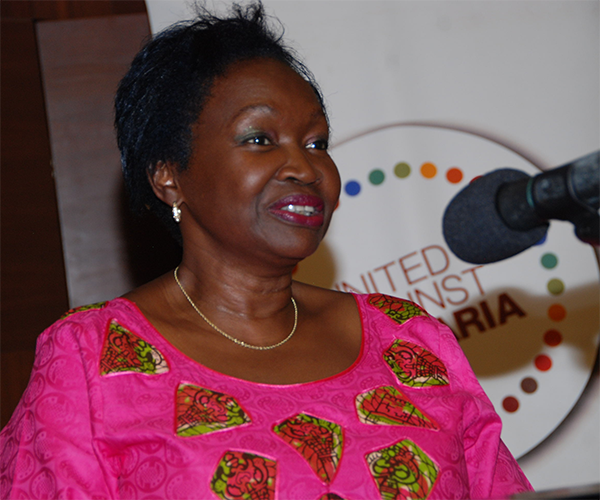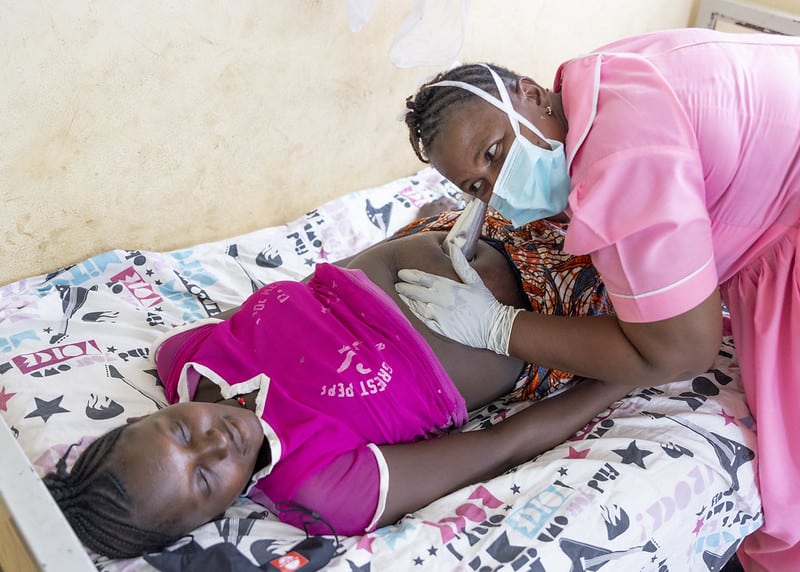How can Uganda save the 100,000 lives a year that are currently taken by malaria? This is the question that a new national multi-sectoral malaria reduction task force will examine as part of an effort that the Uganda Minister of Finance announced during a recent United Against Malaria Business Symposium in Kampala organized by Voices for a Malaria Free Future.
Voices has been mobilizing malaria champions in Uganda since 2006. The project engaged the Minister of Finance, Hon. Maria Kiwanuka, since she had been the manager of Uganda’s Radio One in 2009 and a private sector partner in the malaria cause. Impressed with Voices’ ability to recruit private and public stakeholders, Hon. Kiwanuka has asked Voices to spearhead this initiative.
According to Hon. Kiwanuka, the Malaria Reduction Task Force will feed into her Malaria Reduction Strategy, which will be submitted to the national budget committee in June.
More than 60 guests including members of the Ugandan Parliament, donors and private sector leaders attended the Symposium entitled “How Innovative Investments in Health Can Translate to Competitive Gains.” The Symposium aimed to raise awareness and advocate for increased funding for malaria. Less than 9% of government expenditure in Uganda is allocated towards health—well below the 15% that Uganda and other African Union countries pledged in the 2001 Abuja Declaration. In comparison, bordering Rwanda has increased health expenditure to 23.7%. Other countries that have met and exceeded the 15% target include Liberia, Zambia, Malawi, Madagascar and Togo.
During the Symposium Hon. Kiwanuka, announced her intention to prioritize malaria on the development agenda.
“Uganda is taking steps to ensure that investment in malaria control is money well spent—all in an effort to curtail the substantial economic loss and burden that malaria inflicts on families, health systems and the country as a whole”, Hon. Maria Kiwanuka said in her opening speech at the Symposium. “Malaria control efforts are a proven return on investment but reducing malaria in Uganda requires commitments from all sectors.”
One of the guest speakers at the Symposium was Sherwin Charles of Nando’s Chicken Restarants, a company that has understood the importance of investing in malaria control in Africa. Charles emphasized how by joining the fight against malaria, the company has not only positioned its brand in a positive light, but also formed more partnerships with governments, companies and other organizations. In Charles’ opinion, “joint public-private sector commitment has never been more important and we have gained incredible momentum.”
From a business perspective, it is in companies’ self-interest to end a disease that is affecting their intellectual capital, employees, productivity and the lives of their current and potential customers. Kampala Pharmaceuticals Industries has distributed more than 31 million shillings worth of free medicines to staff and community members with malaria since 2011. “For us, addressing malaria means ensuring that we have a healthy workforce”, said its Director, Nazeem Mohamed. “We saw a big decrease in absenteeism with the running of the clinic, a big difference in the availability of staff.”
The participants of the Symposium agreed that complementing national efforts and collaborating with other partners to strengthen malaria control programs in Uganda is critical for the country and for business. Evidence from other countries reveals that the benefits to companies implementing effective malaria control programs for their workers have been significant.
Enthused with the commitment from representatives of the various sectors present at the business symposium, the Voices Project will work closely with the Minister of Finance in the upcoming months to conduct a landscape review and terms of reference to establish the Task Force, which will be comprised of members from the government, parliamentarians, donor community, civil society and private sector. The first meeting for the task force is tentatively scheduled for mid-November.
***The Business Symposium “How Innovative Investments in Health Can Translate to Competitive Gains” was organized in Kampala, Uganda, by the Johns Hopkins Bloomberg School of Public Health Center for Communication Programs (JHU∙CCP) through the Voices Project.
The Voices Project was established in Uganda in 2009. It seeks to boost domestic financing for malaria control, through public and private sector commitments. Since then, 34 private sector companies have committed to join the fight against malaria – a preventable disease that is endemic in 95 percent of Uganda.





